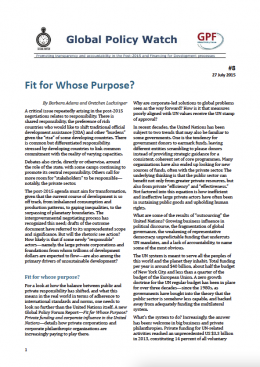By Barbara Adams and Gretchen Luchsinger
A critical issue repeatedly arising in the post-2015 negotiations relates to responsibility. There is shared responsibility, the preference of rich countries who would like to shift traditional official development assistance (ODA) and other “burdens” given the “rise” of some developing countries. There is common but differentiated responsibility, stressed by developing countries to link common commitment with the reality of varying capacities.
Debates also circle, directly or otherwise, around the role of the state, with some camps continuing to promote its central responsibility. Others call for more room for “stakeholders” to be responsible—notably, the private sector.
The post-2015 agenda must aim for transformation, given that the current course of development is so off track, from imbalanced consumption and production patterns, to gaping inequalities, to the surpassing of planetary boundaries. The intergovernmental negotiating process has recognized this need; drafts of the outcome document have referred to its unprecedented scope and significance. But will the rhetoric see action? How likely is that if some newly “responsible” actors—namely, the large private corporations and foundations from whom trillions of development dollars are expected to flow—are also among the primary drivers of unsustainable development?

